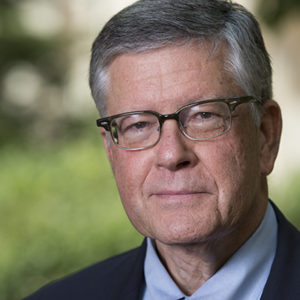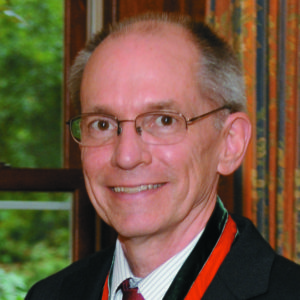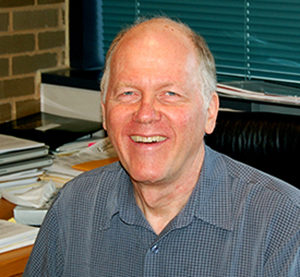Four university scientists are among the 84 members and 21 foreign associates recently elected to the National Academy of Sciences (NAS) in recognition of their distinguished and continuing achievements in original research. Election to the academy is considered one of the highest honors accorded a U.S. scientist or engineer.
Washington University’s new academy members are Fiona Marshall, the James W. and Jean L. Davis Professor, and Henry L. “Roddy” Roediger III, the James S. McDonnell Distinguished University Professor, both in Arts & Sciences; and L. David Sibley, the Alan A. and Edith L. Wolff Distinguished Professor of Molecular Microbiology, and David Van Essen, the Alumni Endowed Professor of Neurobiology, both at the School of Medicine.
“Each of the four members of our faculty elected to the National Academy of Sciences has made pioneering research contributions in their area of scholarly activity,” said Chancellor Mark S. Wrighton. “I am proud of their achievements, and extend enthusiastic congratulations on the important recognition they have received by their election to the National Academy of Sciences.”

Marshall, an archaeologist in the Department of Anthropology, is an Old World prehistorian specializing in the study of early food production in Africa and in the domestication of animals, including donkeys and cats.
Born and raised in Nairobi, Kenya, Marshall’s work always has focused on African archaeology. Her use of zooarchaeological and ethnoarchaeological techniques to understand the relationships between early food production, climatic shifts and the spread of early herders in Africa has advanced the field of study and has positioned her as an international expert on human influences on African savannas and on animal domestication.
Her teaching and research continues to expand our understanding of human-animal relations; complex interactions among ancient agricultural, pastoral and hunter-gatherer societies; the history and resilience of livestock and herding ways of life; and the sustainability of African grasslands.
After earning her doctorate in 1987, Marshall joined the university’s anthropology department as an assistant professor, and she was promoted to full professor in 2002. She was named to the Davis professorship in 2015. Her administrative contributions include directing graduate studies for the department; and serving as interim chair, both in 2006 and during the 2013-14 academic year.

Roediger is a cognitive psychologist known for his scholarship on human learning and memory. His research explores factors that increase learning and retention and their application to education; memory illusions and the development of false memories; the study of people with highly superior memory abilities; and collective and historical memory. He has published more than 250 articles, chapters and reviews and has written or edited 14 books. Three of his textbooks have been through a combined 23 editions.
He joined the university faculty in 1996 as chair of the Department of Psychological and Brain Sciences after teaching at Purdue University, the University of Toronto and Rice University. He received a bachelor’s degree in psychology from Washington & Lee University and his PhD in cognitive psychology from Yale University.
Roediger is a fellow of the American Academy of Arts and Sciences, the American Psychological Association (APA) and the American Psychological Society. He is a past president of the Association for Psychological Science, which granted him the William James Lifetime Achievement Award in 2012. He is a member of the Society of Experimental Psychologists and received its Howard Crosby Warren Medal for his studies of illusory memories. He recently received the Lifetime Achievement Award from the Society of Experimental Psychology and Cognitive Science, a division of APA. He served on the governing board of the Psychonomic Society and received a Guggenheim Fellowship.

Sibley is an expert on the cellular microbiology of parasites, especially Toxoplasma gondii, which causes the common and sometimes debilitating infection toxoplasmosis. These parasitic infections often are benign but can become life-threatening in people with weakened immune systems, including newborns, the elderly, or patients with HIV or undergoing cancer therapies.
He has made major contributions to the field of parasite biology in describing how T. gondii invades cells and what factors determine how severe the infection is. That work also has served as a model for understanding related parasitic infections, including malaria. His lab also is developing ways to study cryptosporidium infection, a major cause of pediatric diarrheal disease in developing parts of the world.
Sibley joined the university faculty in 1991. He earned a bachelor’s degree from Oberlin College in 1978 and a doctorate in zoology and physiology from Louisiana State University in 1985. He completed his postdoctoral training at the U.S. Public Health Service’s National Hansen’s Disease Center and at Stanford University School of Medicine.
He is an elected fellow of the American Academy of Microbiology and has been recognized for his research with the Burroughs-Wellcome Award in Molecular Parasitology and the Alice and C.C. Wang Award in Molecular Parasitology.

Van Essen studies the structure, function, development and evolution of the cerebral cortex — the crumpled outer layer of the brain that is key to language, attention, perception, memory and other functions.
He co-led the Human Connectome Project, which mapped the neural connections of young adults. The project provided a baseline snapshot of a healthy brain from which researchers can begin to identify differences that may be associated with disease. That effort also made major contributions in regard to how scientists acquire, analyze and share information about the living brain.
He currently co-leads two “lifespan” projects that build on the techniques and findings of the Human Connectome Project. The current projects aim to capture the changes that occur as brains develop, mature and age.
A fellow of the American Association for the Advancement of Science since 1994, Van Essen also has received the Krieg Cortical Discoverer Award from the Cajal Club and the George A. Miller Prize for distinguished scholarship from the Cognitive Neuroscience Society.
Van Essen earned his doctoral degree in neurobiology from Harvard Medical School in 1971. After postdoctoral fellowships at Harvard, the University of Oslo, and University College London, he joined the faculty of the California Institute of Technology. He came to Washington University in 1992 as the Edison Professor of Neurobiology and head of the Department of Anatomy and Neurobiology — now the Department of Neuroscience. He served as department head for two decades before stepping down in 2012.